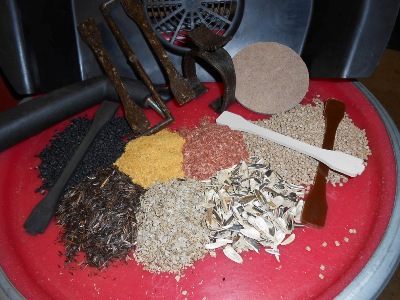Oct 12 2012
A technology developed at North Dakota State University, Fargo, creates performance- driven biocomposite materials by incorporating agricultural by-products into plastics for a wide range of engineering applications.
 c2renew has licensed a process methodology from the North Dakota State University Research Foundation for creating biocomposite materials that incorporate lignocellulosic fibers with commodity thermoplastics to reinforce and strengthen the plastics. Pictured is raw biomass, along with finished biocomposite material, as well as molded parts with c2renew biocomposite. c2renew provides a drop-in material replacement that is a greener alternative to purely petroleum-based plastic products at a lower cost than traditional plastics, without sacrificing critical performance metrics.
c2renew has licensed a process methodology from the North Dakota State University Research Foundation for creating biocomposite materials that incorporate lignocellulosic fibers with commodity thermoplastics to reinforce and strengthen the plastics. Pictured is raw biomass, along with finished biocomposite material, as well as molded parts with c2renew biocomposite. c2renew provides a drop-in material replacement that is a greener alternative to purely petroleum-based plastic products at a lower cost than traditional plastics, without sacrificing critical performance metrics.
The technology also has led to a new start-up company set to serve a spectrum of markets. c2renew corp., a start-up company based in Colfax, N.D., announced today that it has concluded a license agreement with the NDSU Research Foundation (NDSU/RF) for the green technology.
Developed by Dr. Chad Ulven, associate professor of mechanical engineering and his research team at NDSU, the technology could be used anywhere commodity thermoplastics are typically used—but has been focused on agricultural equipment applications such as interior/exterior handles, consoles, and protective shrouds, as well as under-the-hood belt guards, fan shrouds, and ducting.
The technology offsets the costs and need to use petroleum-based polymers/plastics by using renewable agricultural by-products that are currently considered waste, being used as animal feed/bedding, or used as low-cost combustion by-products for heat energy.
“Six years ago, it was my vision from the start to see my research end up in a company located in North Dakota which supplies renewable based materials to a variety of molding companies, benefits agricultural producers, and is staffed with engineers who want to stay in this region with high-tech, well-paid positions,” said Ulven.
The process methodology developed by Ulven and his team uses lignocellulosic fibers from various agricultural sources mixed in with commodity thermoplastics to reinforce and strengthen the plastics. This method works with virgin and recycled commodity and engineered thermoplastics such as polyolefins and polyamides, respectively, where other natural fiber reinforcing processes have not succeeded, according to Dr. Ulven, who also serves as chief technology officer for c2renew.
The green technology developed at NDSU and licensed to c2renew has shown that agricultural by-products can improve stiffness, strength, heat stability, dimensional tolerance, and resistance to UV exposure when introduced correctly to plastics, while lowering the cost of the material. The company has conducted trials with the improved plastics in coordination with several global agricultural, heavy equipment and motor vehicle manufacturers.
“c2renew designs biocomposite materials to meet the performance specifications required by our customers with lower cost, renewable resources,” said Ulven. “We not only supply companies with drop-in plastic replacement solutions, but also assist them with component and process design.”
Michael Fuqua is a partner in developing the technology. He formerly served as a graduate student and postdoctoral research associate of Dr. Ulven’s at NDSU and is now a technical consultant for c2renew. Development of this technology was primarily funded by commodity groups in the state, such as the North Dakota Corn Council and AmeriFlax. Initial funding which helped the company conduct trials of their materials was provided by the North Dakota Agricultural Products Utilization Commission (APUC).
“Start-up companies generated by NDSU research provide pathways to economic success. The coordinated efforts among NDSU researchers, the university’s Technology Transfer Office and the NDSU Research Foundation help lay the groundwork for commercialization of discoveries developed at NDSU,” noted Philip Boudjouk, vice president for Research, Creative Activities and Technology Transfer.
“Licensing of this process methodology to c2renew represents a great opportunity to commercialize this research,” said Dale Zetocha, executive director of the NDSU Research Foundation. “In addition, licensing the technology to a North Dakota company further supports technology-led economic development in the state.”
The NDSU Research Foundation’s technology and licensing income from NDSU research discoveries has grown from less than $1 million in fiscal year 2000 to more than $2 million in fiscal year 2012. NDSU inventors, colleges and departments actively involved in developing innovations share in net revenue distributed by the Research Foundation.
Source: http://www.ndsu.edu